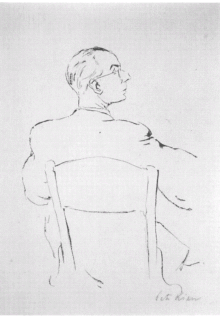
Carlo Sigmund Taube (4 July 1897 – 3 October 1944) was a Czech Jewish pianist, composer and conductor.
Carlo Taube was born in the region of Galicia on 4 July 1897. He studied music in Vienna with Ferruccio Busoni and earned a living by performing in cafes in Vienna, Brno and Prague. Taube, his wife Erika and their child were deported from Prague to the Terezín ( Theresienstadt Ghetto) on 10 December 1941. In April 1942 he conducted the first orchestra performance in the Terezín Magdeburg caserne, premiering his own Terezín Symphony. Taube gave a number of solo concerts and conducted the Terezín band and orchestra. He also performed in the café. Carlo and Erika Taube and their child were deported to Auschwitz-Birkenau about 1 October 1944 (arriving Auschwitz 3 October 1944), where they were murdered. [1]
Taube composed several pieces in Terezín in addition to the Terezín Symphony. These include:
- a Ghetto Lullaby (part of a Ghetto Suite for Alto and Orchestra),
- Poem, Caprice and Meditation, three short pieces for solo violin,
- Ein Jüdisches Kind (A Jewish Child), a lullaby for soprano and piano (the only work by Taube to survive World War II) – recorded by Anne Sofie von Otter
- ^ Karas, Joža (1990). Music in Terezín, 1941-1945. Pendragon Press. p. 127. ISBN 978-0-918728-34-0.
- Makarova, Elena, S. Makarov, V. Kuperman. University Over the Abyss. 2nd ed. Verba Publishers, Jerusalem, 2004.
- Karas, Joža. Music in Terezín, 1941-1945. 1st Ed. Beaufort Books Publishers, New York, 1985.
- Kuna, Milan. Hudba na hranici života (Engl: Music on the Boundary of Life). 1st ed. Naše vojsko/Český svaz protifašistických bojovníků, Prague, 1990.
- 1897 births
- 1944 deaths
- Jews from Galicia (Eastern Europe)
- Austrian pianists
- Austrian male composers
- Austrian composers
- Austrian male conductors (music)
- Austrian Jews who died in the Holocaust
- Jewish composers
- Theresienstadt Ghetto prisoners
- Austrian civilians killed in World War II
- Austrian people who died in Auschwitz concentration camp
- 20th-century Austrian conductors (music)
- 20th-century Austrian male musicians
- 20th-century Austrian composers
- 20th-century pianists
- Austrian male pianists

Carlo Sigmund Taube (4 July 1897 – 3 October 1944) was a Czech Jewish pianist, composer and conductor.
Carlo Taube was born in the region of Galicia on 4 July 1897. He studied music in Vienna with Ferruccio Busoni and earned a living by performing in cafes in Vienna, Brno and Prague. Taube, his wife Erika and their child were deported from Prague to the Terezín ( Theresienstadt Ghetto) on 10 December 1941. In April 1942 he conducted the first orchestra performance in the Terezín Magdeburg caserne, premiering his own Terezín Symphony. Taube gave a number of solo concerts and conducted the Terezín band and orchestra. He also performed in the café. Carlo and Erika Taube and their child were deported to Auschwitz-Birkenau about 1 October 1944 (arriving Auschwitz 3 October 1944), where they were murdered. [1]
Taube composed several pieces in Terezín in addition to the Terezín Symphony. These include:
- a Ghetto Lullaby (part of a Ghetto Suite for Alto and Orchestra),
- Poem, Caprice and Meditation, three short pieces for solo violin,
- Ein Jüdisches Kind (A Jewish Child), a lullaby for soprano and piano (the only work by Taube to survive World War II) – recorded by Anne Sofie von Otter
- ^ Karas, Joža (1990). Music in Terezín, 1941-1945. Pendragon Press. p. 127. ISBN 978-0-918728-34-0.
- Makarova, Elena, S. Makarov, V. Kuperman. University Over the Abyss. 2nd ed. Verba Publishers, Jerusalem, 2004.
- Karas, Joža. Music in Terezín, 1941-1945. 1st Ed. Beaufort Books Publishers, New York, 1985.
- Kuna, Milan. Hudba na hranici života (Engl: Music on the Boundary of Life). 1st ed. Naše vojsko/Český svaz protifašistických bojovníků, Prague, 1990.
- 1897 births
- 1944 deaths
- Jews from Galicia (Eastern Europe)
- Austrian pianists
- Austrian male composers
- Austrian composers
- Austrian male conductors (music)
- Austrian Jews who died in the Holocaust
- Jewish composers
- Theresienstadt Ghetto prisoners
- Austrian civilians killed in World War II
- Austrian people who died in Auschwitz concentration camp
- 20th-century Austrian conductors (music)
- 20th-century Austrian male musicians
- 20th-century Austrian composers
- 20th-century pianists
- Austrian male pianists